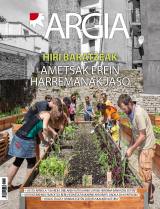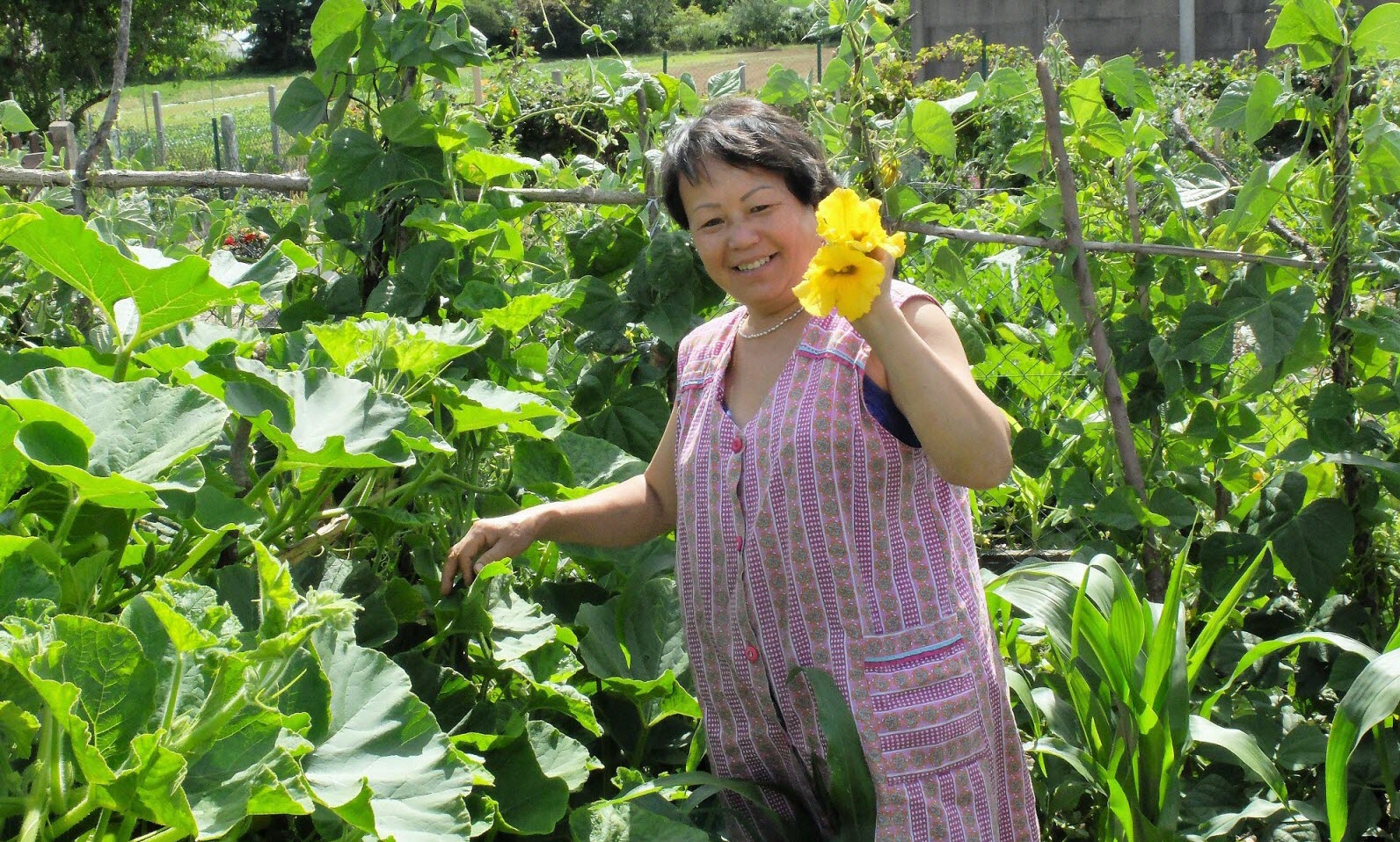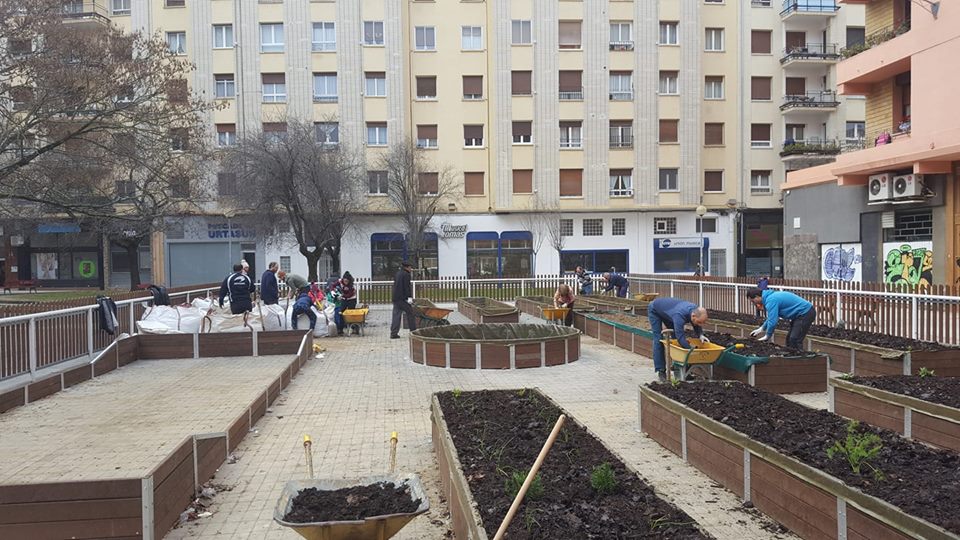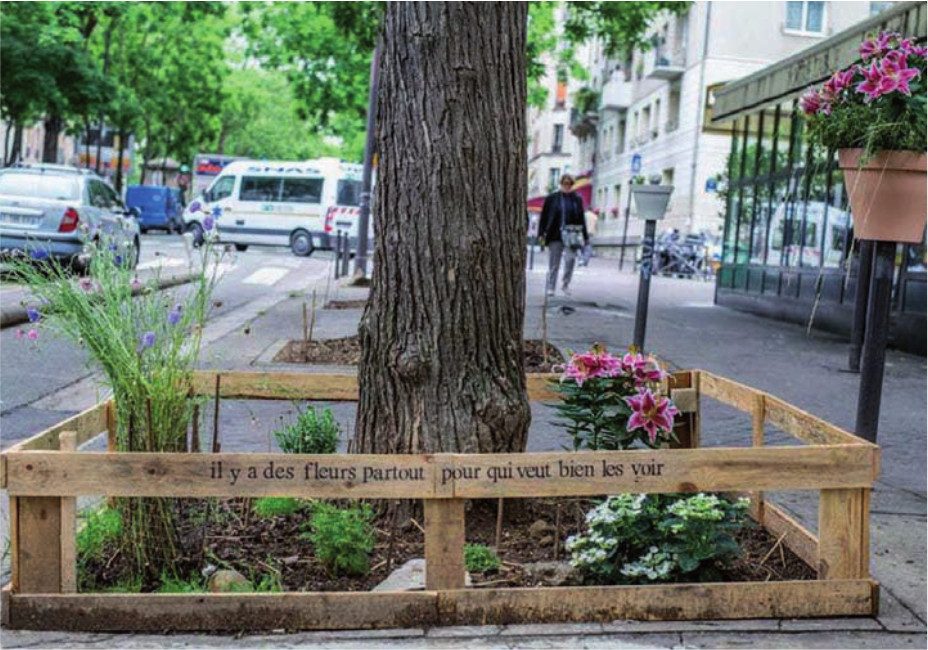The urban gardens come from the lands of the Comarca of Pamplona
- More and more people in the world are moving from rural to urban areas. By 2050, 6.3 billion people are expected to live in cities – currently 3.6 billion live. And in the cities of the world, there's rarely been such a big separation between people and nature. In response, the orchard emerges from the roots of cities.
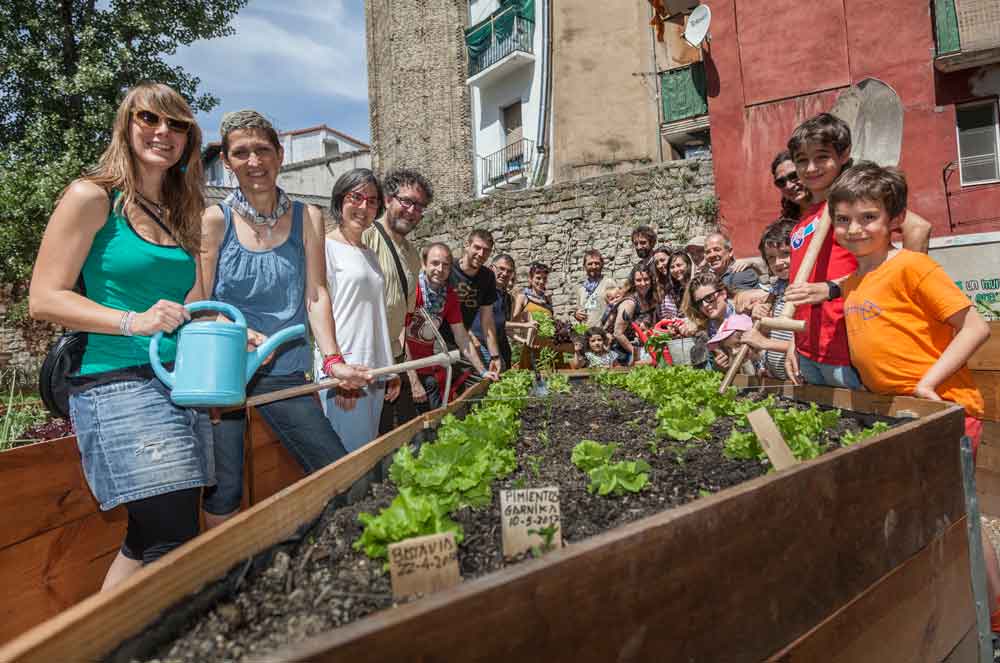
At the heart of the systemic and ecological crisis, there is always room for hope, and in the cement forest, one of them is the urban garden or the communal garden. In many cities around the world, the garden is an increasingly strong reality, and also in the Basque Country. In the last decade orchards have emerged in a similar way to mushrooms in our extensive geography: productive orchards, leisure orchards, typical gardens of farmhouses, therapeutics, schools, urban orchards, occupied…
The orchards irrigated by the water of the Arga are well known in Pamplona and their vegetables are appreciated in their markets. In the organic garden are also pioneers the producers of the meandering fruit of Aranzadi. The horticulturist Agustín Beroiz was one of the best known, but, like other farmers, he had to leave the area when the City of Pamplona demolished the traditional vegetable gardens and built the Aranzadi Park in 2012. One of the typical artimañas of developmentalism is the launch of rich orchards to build a theme park on horticulture.
Land, sun, water plus care, fertility. This is the orchard equation. In addition to these traditional estates, the one who approaches the garden can share many others with the rest of the attendees. From there, every urban orchard is a world.
Piparrika in the Old Town of Pamplona
The garden Piparrika has been built in the Plaza Pellejerías del Casco Viejo de Pamplona, a public space that until now has remained closed for decades. It is located on the slopes of Jarauta Street and occupies about 1,500 square meters. It has been recovered by members of the Piparrika group in collaboration with the City Council of Pamplona/Iruña.
The group was created in 2013 and presented the project to the previous city council. There was no opposition, but it was not launched until the City of Change was established. This year the City Hall launched the urban garden project, which was formed as an association and won by Piparrika. There are already about 40 people who are dedicated to the management of the garden, have three committees of work - education, orchard and dynamization - and in the assembly they make the most important decisions about the project.

During the summer of 2016 the City Hall carried out the refurbishment of the plaza: reform of the access fence, lifting a protective fence, laying four floors and others. In addition, the City Hall has acquired a variety of equipment, both for the garden and for the elaboration of planks, wood shavings for planting. In total, it has had a budget of 13,000 euros between 2016 and 2017, most of them for refurbishment works of the plaza. Tables, composting and other construction works have been carried out this year in Auzolan.
Andrea, Monica and Pedro have been sitting in the garden seats, but the afternoon storm has sent us to take refuge. “In addition to tourism and bars, we want to promote other kinds of leisure and the urban garden is a good opportunity for this. In addition, it offers those who are alone and the neighbors in general a new reception space,” says Andrea. They want to make it clear that this is a participatory project: “The group and this vegetable garden are completely open and anyone can come to work, speak or just enjoy the tranquility of the area. This is a totally open public space, and that's what we want."
The garden is being built with the current town hall, but the trio stresses that they do not want to link the project with any political party: “This is a broad project of citizenship, and even if the City Hall changed, this should go ahead.”
In one way or another, hundreds of people have already worked in the garden: “On a Saturday in May, for example, a hundred people of the youth movement in the neighborhood worked and then we ate there,” says Mónica. In other auzolans it also meets of all kinds, children, young people and adults, and if it's Saturday or Sunday, it eats there, if weather conditions allow.

Yes, we still have to eat what they have brought us from home, as they are growing beet, beans, peppers or tomatoes. Urazak, yes, these are big and took about 30 of them to the popular food that is celebrated on May 27 in the Plaza de Santa Ana. That day the doors were opened completely, and from now on the garden will be open day and closed at night, like the Plaza de Santa Ana.
“This orchard is not productive,” Pedro says, “its function is more educational, more open to the philosophy of the garden. We claim that in cities there is not only cement. And also food sovereignty.” He is one of the most knowledgeable about horticulture and patiently explains the secrets of the garden: “These egg skins, for example, are dwarfed and, spread down the ground between the lettuce, smokes off the bibs.”
The project is rich and takes great care of Piparrika's friends. The agreement with the City Council requires that a number of requirements be met, including ecological requirements, the management of the waste generated and the non-sale of the products received. There are no problems, it's a philosophy embedded in the DNA of the association: in addition to the principles cited, they use waterways to increase participation and save water, or they build as much as possible with recycled materials. They have carried out numerous activities in the garden and anyone who wants to know more about them can do so through Piparrika’s Facebook account.
City Council Satisfaction
Marina Jiménez, a technique of the City Council of Pamplona dedicated to urban gardens, is pleased with the work carried out with Piparrika: “We have put the place and the material, they have the management. We are seeing that a great relationship is being made with the rest of the groups in the neighborhood, with the geriatric, with the association of parents of the San Francisco school... There are many other gardens in Pamplona, but these are special, among other things, because of the world of the relationships they build.”
Jiménez has announced that a line of aid for urban orchards will be opened next year. The requirement for access to grants is to set up an association, to contact the city council and to set it in motion. There are also other projects, including the Krispila group in the Chantrea district, which is a kind of lettuce, or the Baratxuri group that has been formed in the Bustintxuri district. “It would be beautiful to build a network of urban gardens and there will be more and more,” says Jiménez.

Maya Bernal works in Krispila, eight people started in mid-February 2016 with the project and in October they will start the vegetable garden in the Plaza del Tártaro de la Txantrea. “The plaza is still a park, but we want to reclaim another park with the garden,” Bernal tells us. Here they are also going to play in the scenarios, but they expect production to be higher than in Piparrika. The philosophy is the same: “Auzolana, the center of relationships, I work from all over the world and then take the vegetables home.”
Huerta occupied by Mendillorri
Mendillorri has been a district of Pamplona since 1998, where some 11,000 inhabitants live. The youthful movement of the area occupied the municipal land without use three years ago, where horticultural activity began. They do not need to fight with the City Hall, which would want to work as with the other vegetable gardens, establish themselves as an association, present the project, make the contest and start it.


For young people, the City Hall wants to regulate everything and its model is self-management. “Public places are people’s. The neighborhood and the population legitimize the garden. We have made the popular garden, that the city council trust and respect the project,” says the young Xabi Senosiain, who works on the popular garden project. Among other things, he says that the vegetable garden was constituted as an alternative to consumption and that they depreciated what was a landfill. In Senosiain’s words, the project currently involves 50-60 young people, “at first we were all young and then the older ones have approached creating a good interaction”. The municipal technician Jiménez considers that “if an association were made, they would receive subsidies, like the others, because otherwise the city council cannot distribute subsidies to anyone”.
Also in Sarriguren
Sarriguren is a neighborhood in the municipality of Egüés that has municipal gardens for recreation, but also a small urban garden. The 80,000 square meters for construction remain unbuilt and the creators of the orchard claim that until they are built they have the right to produce food for the neighbors. In addition to these soils, the neighborhood has 300,000 square meters of green areas, most of them grass, and consider their maintenance to be quite expensive: “Urban green areas should gradually be transformed into forests and agricultural land.”

It's Mikel's words, which I've talked to over the phone, and I've explained that if there was any gap, I could go and take pictures in the afternoon. When I got to the village orchard, I saw a family sitting and talking. “Is Mikel one of you or are you from the garden?” I asked. “No, we are not. We went and stopped. What a nice corner no?” one of them replied.
Mikel explains that it is a bet we have made since we were young, from very small. “We started with a box of wooden fruits from the shops. Inside we put the compost, four lettuce and a few small onions, and next to that we left a shower, all close to a fountain. The next day, a child would water the box. And one of the following days we put the poster. “The garden of the town of Sarriguren belongs to everyone. Encourage and take care.”
Little by little the vegetable garden has been flourishing, as you can see in the photo of these pages. “The vegetable garden allows us to do things collectively and we want to take advantage of them, share the vegetable garden.” They refer to what they did in the English city of Todmorden: “There they started planting without asking for permission. Pam Warhurst said: ‘Don’t ask for permission, start planting.’ Then the city hall saw the movement well and began to help.”
In June, the proposal for the creation of an Edible Forest of Sarriguren in an unused green space was presented in the participatory budgets of the Valle de Egüés. They think of the Basalburu de Vitoria: “We may not win,” says Miguel, but we have already managed to broaden the idea.”
On a wall of piparrika they have painted a small mural and have written two sentences: “Let’s look at dreams and gather hope. Let’s build a world where many worlds belong.” The young Epicurus began cultivating his vegetable garden when, at the end of the fourth century, the first polis of democracy in Greece collapsed. It opened the doors of philosophy to slaves and women, when it was poorly seen to do that in the classical schools of Athens. This innovative peasant revolution wanted to do more with the fruit of the orchard than with ideas. I am convinced that Epicurus from his school and the inhabitants of the popular orchards, 2,500 years later, represent a similar future for the world.

The Huerta Urbana de Udaberri is a project that has been launched in the San Juan district of Pamplona. The green spaces already exist in the area, but this project, launched by the association of neighbors San Juan Xar, wants the citizenship to have an active role in this space... [+]
“As a young man in Bilbao, I felt that the city’s society is not connected to agriculture.” This is how Kepa Añibarro Zorita explains from where his interest in the environment and land arose. After studying Environmental Chemistry and Landscaping and Rural Environment,... [+]
Elikagaien komertzializazio bide laburrak eta janari osasungarria joera bihurtu omen dira, baina baserritarrek zer diote horren inguruan?
Uztailaren 20an hasiko da Donostiako Jazzaldia eta Donostiako Alde Zaharreko Gazte Asanbladak kezka adierazi du: urtero jazz jaialdiaren babesle nagusia den garagardo marka iragartzeko kartel handi bat jartzen du Trinitate plazan, hain justu gazteek joan den apiriletik auzo... [+]
Uliako mintegien parkea arriskuan jarriko lukeen operazio urbanistikoaz herri galdeketa egiteari uko egin dio Donostiako Udaleko plenoak, EAJren eta PSE-EEren botoekin.
Donostiako Alde Zaharreko Gazte Asanbladak jakinarazi duenez, asteazken goizean udaltzainek Trinitate plazaren goiko aldean martxan jarritako auzo baratzea desegin dute.
Barakaldoko Ekologistak Martxaneko ordezkari legala hiri horretako 1. Instrukzio-epaitegian deklaratzera deitu dute, gaur eguerdian, higiezinak usurpatzeko delitua leporatuta. Talde ekologistak prentsa ohar baten bidez azaldu duenez, abandonatutako lursail bat berreskuratu eta... [+]









